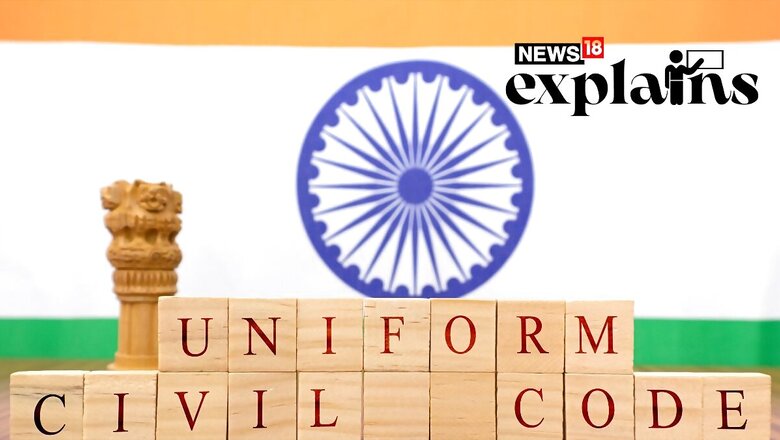
views
Two events took place recently which brought the issue of Uniform Civil Code (UCC) to the limelight again.
First, on June 14, the 22nd Law Commission of India sought fresh suggestions from various stakeholders, including public and religious organisations, on UCC. The 21nd Law Commission had also examined the need for a Uniform Civil Code applicable to all sections of society, irrespective of their religion. In 2018, the 21st Law Commission had published a consultation paper titled “Reforms of family law.”
However, according the Law Commission, “Since more than three years have lapsed from the date of issuance of the said consultation paper, bearing in mind the relevance and importance of the subject and also the various court orders on the subject, the 22nd Law Commission considered it expedient to deliberate afresh over the subject”.
The second event that brought the issue of the UCC to the limelight was a public dialogue programme organised on June 14 by the committee formed by the Uttarakhand government to draft the UCC for the state.
Amid the developments, let’s understand what the UCC is, and what the debate around the issue is:
What is the Uniform Civil Code?
In the simplest terms, the UCC means one law which would be applicable to all religious communities in matters such as marriage, divorce, inheritance, adoption, maintenance etc. India has a uniform or one set of ‘criminal code’ for all its citizens but doesn’t have uniform civil law.
Constitutional provision
Article 44 of the Indian constitution which is part of the directive principles of the state policy reads, “The state shall endeavour to secure for citizens a Uniform Civil Code (UCC) throughout the territory of India.”
In the famous Shah Bano case in 1985, the apex court said Article 44 remained a “dead letter” and expressed the need for a uniform civil code.
What constituent assembly said about UCC
Dr BR Ambedkar, who was chairperson of the drafting committee of the Indian constitution, said, “We have a uniform and complete Criminal Code operating throughout the country, which is contained in the Penal Code and the Criminal Procedure Code. We have the Law of Transfer of Property, which deals with property relations and which is operative throughout the country. Then there are the Negotiable Instruments Acts: and I can cite innumerable enactments which would prove that this country has practically a Civil Code, uniform in its content and applicable to the whole of the country.”
He added, “The only province the Civil Law has not been able to invade so far is Marriage and Succession”.
Important Court judgments favouring UCC
Shah Bano Case
The Supreme Court remarked, “A common civil code will help the cause of national integration by removing disparate loyalties to law which have conflicting ideologies.”
Sarla Mudgal Versus Union of India
In this case the apex court stated, “Pandit Jawahar Lal Nehru, while defending the introduction of the Hindu Code Bill instead of a uniform civil code, in the Parliament in 1954, said “I do not think that at the present moment the time is ripe in India for me to try to push it through”. It appears that even 41 years thereafter, the Rulers of the day are not in a mood to retrieve Article 44 from the cold storage where it has been lying since 1949”.
It added, “The Governments – which have come and gone – have so far failed to make any effort towards “unified personal law for all Indians”. The reasons are too obvious to be stated. The utmost that has been done is to codify the Hindu law in the form of the Hindu Marriage Act, 1955. The Hindu Succession Act, 1956, the Hindu Minority and Guardianship Act, 1956 and the Hindu Adoptions and Maintenance Act, 1956 which have replaced the traditional Hindu law based on different schools of thought and scriptural laws into one unified code. When more than 80% of the citizens have already been brought under the codified personal law there is no justification whatsoever to keep in abeyance, any more, the introduction of “uniform civil code” for all citizens in the territory of India.”
Goa an exception
Goa is one state that holds an exception of having a UCC for all its citizens.
In a 2019 succession case of a Goan resident, the Supreme Court observed, “It is interesting to note that whereas the founders of the, Constitution in Article 44 in Part IV dealing with the Directive Principles of State Policy had hoped and expected that the State shall endeavour to secure for the citizens a Uniform Civil Code throughout the territories of India, till date no action has been taken in this regard. Though Hindu laws were codified in the year 1956, there has been no attempt to frame a Uniform Civil Code applicable to all citizens of the country despite exhortations of this Court”.


















Comments
0 comment